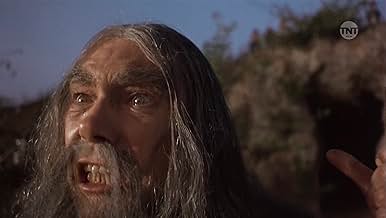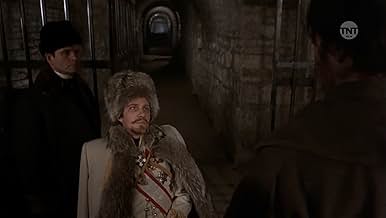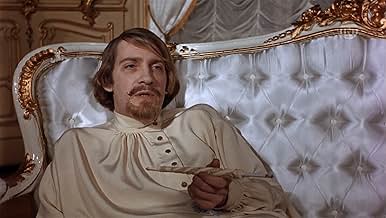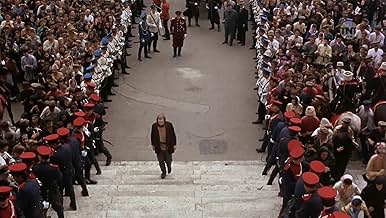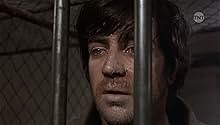IMDb-BEWERTUNG
6,7/10
1535
IHRE BEWERTUNG
Füge eine Handlung in deiner Sprache hinzuIn Czarist Russia, around 1911, a Russian-Jewish handyman, Yakov Bok (Sir Alan Bates), is wrongly imprisoned for a most unlikely crime.In Czarist Russia, around 1911, a Russian-Jewish handyman, Yakov Bok (Sir Alan Bates), is wrongly imprisoned for a most unlikely crime.In Czarist Russia, around 1911, a Russian-Jewish handyman, Yakov Bok (Sir Alan Bates), is wrongly imprisoned for a most unlikely crime.
- Regie
- Drehbuch
- Hauptbesetzung
- Für 1 Oscar nominiert
- 8 Nominierungen insgesamt
Empfohlene Bewertungen
This was Frankenheimer's second big color movie (after Grand Prix in 1966). Alan Bates was nominated for the Academy Award for his portrayal of Yakov Bok, and his performance was certainly Oscar worthy. The movie is based on Bernard Malamud's 1966 Pulitzer Prize winning novel.
---------------------------------------------------------------------
"Bernard Malamud based The Fixer on the case of Mendel Beilis, a Jewish bookkeeper for a brick factory who was accused of ritualistically murdering a Christian child. With very little evidence against him, the Russian government pushed for the conviction of Beilis in order to justify anti-Semitic policies that were being enacted at the time. The novel's protagonist, Yakov Bok, also works in a brick factory, and he is charged, for no particular reason except being Jewish, for a crime just like the one with which Beilis was charged. As in Malamud's fictionalized version, the actual case occurred between 1911 and 1913 in the Ukrainian capital, Kiev. The Beilis case is credited with being one of the main contributing factors in bringing about the Russian Revolution by raising the sense of distrust Russian citizens felt toward their government and the anger of people around the world. The political situation surrounding the case is hardly touched upon in The Fixer. Most of the book focuses on Yakov's life in solitary confinement, waiting for years in prison for the murder charge to be formally levied against him so that he can get on with the trial.
The Fixer was published in 1966, more than fifty years after the Beilis case had been settled in court, but Malamud could count on his audience to be familiar with the circumstances of what had happened because the case was and is an important event in the history of the Jewish struggle for peace and security. The book won the National Book Award and the Pulitzer Prize, and is considered one of the finest in the canon of books by one of America's finest authors." – Quoted from encyclopedia.com
--------------------------------------------------
The movie follows the odyssey of Yakov Bok (Alan Bates)—'a fixer' or handyman--as he leaves his small pre-Revolutionary Ukrainian town to travel to the city of Kiev. Although he has no strong religious or political feelings and never had thought that he could only be defined by one word--'Jew'--he lives in the ghetto. When a tailor in the ghetto suggests that he could make more money by passing as a Christian in the city, he tries. After saving a Christian, Lebedev (Hugh Griffith), in the street, he is taken in to Levedev's house and given work. Lebedev's crippled daughter, Zinaida (Elizabeth Hartman), seduces him and he willingly follows her. But, when he finds that she is 'unclean (having her period), he turns her down and leaves.
But, events change his life when he is accused of killing a young Christian boy in a 'Jewish ritual murder. Once imprisoned, almost everyone inside and outside of the prison hates him. Even though he is befriended by a defender, Bibikov (Dirk Bogarde), he is relentlessly tortured and badgered by his prosecutor, Grubeshov (Ian Holm).
During Bok's imprisonment, the case against him is built on a series of unproven accusations. The murdered boy's mother testifies that she witnessed Bok killing her son. Zinaida testifies against him (based on her previous embarrassment of having seduced him and then been turned down). However, as a Jew, he is never given the benefit of a public trial. His crime rests on the fact that he IS a Jew; that he reads Spinoza; and that he demands—and is refused--a trial for simple human decency. As his imprisonment and torture is extended he continues to grow more determined. When all attempts fail to get him to confess to the murder, a representative of the Czar offers him a pardon. But, he refuses the pardon since he has committed no crime. His determination to fight for a public trail continues until the very end.
Although this film is very good, it doesn't hold up as well as Frankenheimer's black and white movies from the 1960s. As the saying goes, 'the book is better than the movie,' Still, Bates acting is laudable and should be seen if possible.
---------------------------------------------------------------------
"Bernard Malamud based The Fixer on the case of Mendel Beilis, a Jewish bookkeeper for a brick factory who was accused of ritualistically murdering a Christian child. With very little evidence against him, the Russian government pushed for the conviction of Beilis in order to justify anti-Semitic policies that were being enacted at the time. The novel's protagonist, Yakov Bok, also works in a brick factory, and he is charged, for no particular reason except being Jewish, for a crime just like the one with which Beilis was charged. As in Malamud's fictionalized version, the actual case occurred between 1911 and 1913 in the Ukrainian capital, Kiev. The Beilis case is credited with being one of the main contributing factors in bringing about the Russian Revolution by raising the sense of distrust Russian citizens felt toward their government and the anger of people around the world. The political situation surrounding the case is hardly touched upon in The Fixer. Most of the book focuses on Yakov's life in solitary confinement, waiting for years in prison for the murder charge to be formally levied against him so that he can get on with the trial.
The Fixer was published in 1966, more than fifty years after the Beilis case had been settled in court, but Malamud could count on his audience to be familiar with the circumstances of what had happened because the case was and is an important event in the history of the Jewish struggle for peace and security. The book won the National Book Award and the Pulitzer Prize, and is considered one of the finest in the canon of books by one of America's finest authors." – Quoted from encyclopedia.com
--------------------------------------------------
The movie follows the odyssey of Yakov Bok (Alan Bates)—'a fixer' or handyman--as he leaves his small pre-Revolutionary Ukrainian town to travel to the city of Kiev. Although he has no strong religious or political feelings and never had thought that he could only be defined by one word--'Jew'--he lives in the ghetto. When a tailor in the ghetto suggests that he could make more money by passing as a Christian in the city, he tries. After saving a Christian, Lebedev (Hugh Griffith), in the street, he is taken in to Levedev's house and given work. Lebedev's crippled daughter, Zinaida (Elizabeth Hartman), seduces him and he willingly follows her. But, when he finds that she is 'unclean (having her period), he turns her down and leaves.
But, events change his life when he is accused of killing a young Christian boy in a 'Jewish ritual murder. Once imprisoned, almost everyone inside and outside of the prison hates him. Even though he is befriended by a defender, Bibikov (Dirk Bogarde), he is relentlessly tortured and badgered by his prosecutor, Grubeshov (Ian Holm).
During Bok's imprisonment, the case against him is built on a series of unproven accusations. The murdered boy's mother testifies that she witnessed Bok killing her son. Zinaida testifies against him (based on her previous embarrassment of having seduced him and then been turned down). However, as a Jew, he is never given the benefit of a public trial. His crime rests on the fact that he IS a Jew; that he reads Spinoza; and that he demands—and is refused--a trial for simple human decency. As his imprisonment and torture is extended he continues to grow more determined. When all attempts fail to get him to confess to the murder, a representative of the Czar offers him a pardon. But, he refuses the pardon since he has committed no crime. His determination to fight for a public trail continues until the very end.
Although this film is very good, it doesn't hold up as well as Frankenheimer's black and white movies from the 1960s. As the saying goes, 'the book is better than the movie,' Still, Bates acting is laudable and should be seen if possible.
10Levi-65
In 1969 while in Basic Training at Fort ORD, California our Company viewed this movie. Being 1969 and all that was happening at that time and as basic trainees, in an infantry company, 18 to 21 years of age, most destined for Vietnam, most had few things in our minds beyond our survival in the months to come. The strength, determination and courage in the face of oppression, constant disappointment and the insurmountable odds of survival unified all 120+ of us to a standing ovation of applause and cheering at the end. We all came from such different backgrounds, Watts, Oklahoma, East LA, Salt Lake City, Montana and Chicago. We were all of different ethnic backgrounds, Hispanic, Black, Irish, Catholic etc. None of us knew of Jewish life in Tzarist Russian. All felt a bond with "The Fixer", a victim of times, prejudice and "The System".
For many of us, the move, "The Fixer" did more than just occupy an afternoon away from military training. It connected us with a spirit, a humanness to deal with and hopefully survive adversity. To this day the other message I carry is that every act we do is a political statement. Even the act of being, "Apolitical" is a statement of politics.
A Great & Poignant Movie that should be included in everyones film experiences!
For many of us, the move, "The Fixer" did more than just occupy an afternoon away from military training. It connected us with a spirit, a humanness to deal with and hopefully survive adversity. To this day the other message I carry is that every act we do is a political statement. Even the act of being, "Apolitical" is a statement of politics.
A Great & Poignant Movie that should be included in everyones film experiences!
Alan Bates is one of the most sadly forgotten actors from the 60's and 70's. While he's been doing mostly stage work recently, many seem to have forgotten the extraordinary output that he had: Zorba the Greek, A Kind of Loving, Georgy Girl, Far From the Madding Crowd, An Unmarried Woman, Women in Love, Butley, and this.
His performance as Yakov Bok, a Jewish handyman wrongly accused of murder, is the the driving force behind Dalton Trumbo's adaption of Bernard Malamud's Pulitzer Prize-winning novel. While John Frankenheimer's direction is rather clunky at times (a disappointment, seeing as he was coming off a good run with The Manchurian Candidate, Seven Days in May, and The Train), the length is about twenty minutes too long, and a few supporting characters remain under-developed, his gritty performance keeps The Fixer going. It's interesting to see Yakov go from being a non-religious Jew who agrees to work for an Anti-Sematic official for money to a political prisoner who will proclaim his innocence despite whatever torture is inflicted on him. As the brutality of the officials grows harsher, his religious feelings grow stronger, and Bates makes it believable from beginning to end.
Dirk Bogarde also does well as a lawyer who will defend Yakov at any cost (even though his character's intentions remain unclear), as does Ian Holm as an investigator who considers Jews to be inhuman criminals.
The Fixer had a brief run on video a few years ago, but I am not sure if it is still being circulated.
His performance as Yakov Bok, a Jewish handyman wrongly accused of murder, is the the driving force behind Dalton Trumbo's adaption of Bernard Malamud's Pulitzer Prize-winning novel. While John Frankenheimer's direction is rather clunky at times (a disappointment, seeing as he was coming off a good run with The Manchurian Candidate, Seven Days in May, and The Train), the length is about twenty minutes too long, and a few supporting characters remain under-developed, his gritty performance keeps The Fixer going. It's interesting to see Yakov go from being a non-religious Jew who agrees to work for an Anti-Sematic official for money to a political prisoner who will proclaim his innocence despite whatever torture is inflicted on him. As the brutality of the officials grows harsher, his religious feelings grow stronger, and Bates makes it believable from beginning to end.
Dirk Bogarde also does well as a lawyer who will defend Yakov at any cost (even though his character's intentions remain unclear), as does Ian Holm as an investigator who considers Jews to be inhuman criminals.
The Fixer had a brief run on video a few years ago, but I am not sure if it is still being circulated.
It is not often that cinema can do justice to a great novel. This one brings out the existential questions of the lead character Yakov Blok in an honest manner, true to the original. I think I would place the credit more with screenplaywriter Dalton Trumbo for this effort. He did not even change some of the key lines of the book. I wonder what Malamud would have thought of the script.
Frankenheimer needs praise in some sequences, the prison sequences and the seduction sequence--but what amuses me no end is why he chose to cast the three actresses who speak their lines with no care for even a semblance of being East European.
Alan Bates, Dirk Bogarde, Hugh Griffith, David Warner and Ian Holm are all good actors but Frankenheimer made no effort to make them speak like Russians or East Europeans. Bogarde is predictable in his role, but Alan Bates carried the film. He alone played his role with conviction. Maurice Jarre's music was good but not his best.
Like "Gandhi" this film will be remembered because of the subject, not because of its cinema. The true hero was not Bates, not Trumbo, not Frankenheimer--it was Malamud!
Frankenheimer needs praise in some sequences, the prison sequences and the seduction sequence--but what amuses me no end is why he chose to cast the three actresses who speak their lines with no care for even a semblance of being East European.
Alan Bates, Dirk Bogarde, Hugh Griffith, David Warner and Ian Holm are all good actors but Frankenheimer made no effort to make them speak like Russians or East Europeans. Bogarde is predictable in his role, but Alan Bates carried the film. He alone played his role with conviction. Maurice Jarre's music was good but not his best.
Like "Gandhi" this film will be remembered because of the subject, not because of its cinema. The true hero was not Bates, not Trumbo, not Frankenheimer--it was Malamud!
I came home from work after working a 24 hour shift and turned on the TV to find something mindless to numb my brain (ready to do the same thing tomorrow), and turned on this film, I had to watch it to the end. The story is simple enough, its the tale of someone who is wrongly accused of a crime in order to satisfy someones higher political manifesto but there's an ageless quality to it. I'm not particularly clued up on films or politics, and certainly not a critic but I have to say that in these times of arrest without trial or evidence, this film strikes a chord. This film highlights some of the best and worst aspects inherent to human nature, a truly remarkable work.
Wusstest du schon
- WissenswertesThis movie was made in Hungary, then a Communist country. The cast and crew were obliged to work six days a week under considerable pressure, and director John Frankenheimer was very unpopular. Sir Dirk Bogarde always referred to him thereafter as "Frankenstein", while Sir Ian Holm reported in his memoirs nearly forty years later, that Frankenheimer had, during filming, a very obvious extra-marital affair with the daughter of screenwriter Dalton Trumbo, even though his wife, Evans Evans, was in attendance.
- VerbindungenFeatured in Hollywoodism: Jews, Movies and the American Dream (1998)
Top-Auswahl
Melde dich zum Bewerten an und greife auf die Watchlist für personalisierte Empfehlungen zu.
- How long is The Fixer?Powered by Alexa
Details
- Laufzeit2 Stunden 12 Minuten
- Sound-Mix
- Seitenverhältnis
- 1.85 : 1
Zu dieser Seite beitragen
Bearbeitung vorschlagen oder fehlenden Inhalt hinzufügen

Oberste Lücke
By what name was Ein Mann wie Hiob (1968) officially released in India in English?
Antwort
